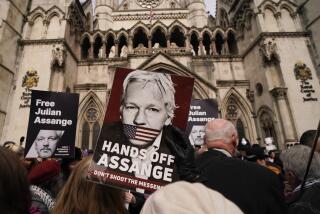Assange extradition may proceed, Britain’s High Court rules
Julian Assange can be shipped to Sweden to face questioning on allegations of rape and molestation, Britain’s High Court ruled Wednesday, rejecting the WikiLeaks founder’s appeal against extradition in what he insists is a politically motivated case.
Judges upheld a lower-court decision allowing the extradition to proceed, dismissing Assange’s arguments that the arrest warrant for him was flawed and an example of judicial overkill. The ruling paves the way for him to be sent to Sweden by the end of the month unless he successfully applies for his case to be heard by Britain’s separate Supreme Court.
The 40-year-old Australian said he and his lawyers would decide what to do in the next two weeks. He remains free on bail, under “mansion arrest” on a rich supporter’s country estate where he has lived for 11 months, forced to wear an electronic monitoring tag and to report to police daily.
Assange tried to downplay the decision, describing the proceedings and conclusions as “merely technical” in nature.
Wearing a dark suit and sporting a red poppy on his lapel to mark the upcoming Remembrance Day (Armistice Day in the United States), he listened impassively to the judges’ decision in court. Afterward, in an uncharacteristically brief statement to reporters and a few supporters, Assange declared, “I have not been charged with any crime in any country.”
The two judges said their decision was indeed based on points of law and procedure — in other words, whether the arrest warrant was properly issued and executed — and not on the strength or weakness of the evidence, which lay beyond the scope of the extradition hearing.
But they said the allegations against Assange centered on “serious sexual offenses” and rejected his lawyers’ contention that they did not merit extradition.
The allegations against Assange stem from separate encounters he had with two women in August 2010 in Stockholm. The women say he refused their requests that he use a condom during sex; one of the women also accuses Assange of initiating intercourse with her while she was asleep and unable to give her consent.
Assange says the sex was consensual. His lawyers also contend that, even if the allegations were true, the behavior would not necessarily constitute crimes under British law. Swedish laws on sexual assault are more sweeping than those here.
But British prosecutors, acting on behalf of their Swedish counterparts, said the allegations were sufficiently serious because they involved some physical force. One of the women accuses Assange of using his body weight to keep her pinned beneath him while he had sex with her.
Assange was questioned by police in Stockholm shortly after the encounters but left Sweden in September 2010 for Britain, despite prosecutors’ attempts to conduct a follow-up interview. He turned himself in to police in December in London after learning of a European arrest warrant for him.
Because of the intense interest in and news coverage of the case, his attorneys say Assange would not receive a fair trial in Sweden. They also argue that the charges against him are politically motivated, a pretext for shipping him on to the U.S. for prosecution in connection with WikiLeaks’ controversial publication last year of hundreds of thousands of State Department cables.
Blaise Buma, a student from Cameroon who protested outside the courthouse Wednesday, is convinced of that.
“It’s no coincidence that the charges were brought after the publication of WikiLeaks documents,” said Buma, 23. “I see Assange as a champion of free speech in the world, and he’s playing the role that traditional media should be playing in bringing to light what happens behind the curtains.”
But it’s been a bad year for Assange since his arrest. He has struggled to pay his considerable legal bills, despite expressions of support from high-profile personalities such as documentarian Michael Moore. His whistle-blowing website is short of cash as well.
And a few weeks ago, the anti-secrecy campaigner failed in his attempt to block publication of a book billed, somewhat paradoxically, as his “unauthorized autobiography.” Assange had worked with a ghostwriter on the memoir but later pulled out of the project and tried to prevent it from hitting bookshelves.
The book has sold poorly.
Stobart is a news assistant in The Times’ London bureau.
More to Read
Start your day right
Sign up for Essential California for news, features and recommendations from the L.A. Times and beyond in your inbox six days a week.
You may occasionally receive promotional content from the Los Angeles Times.







